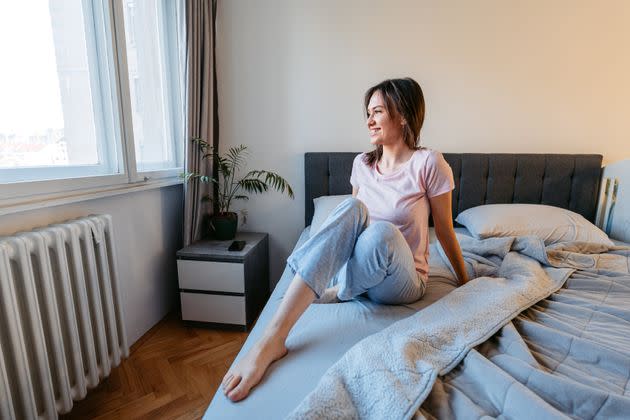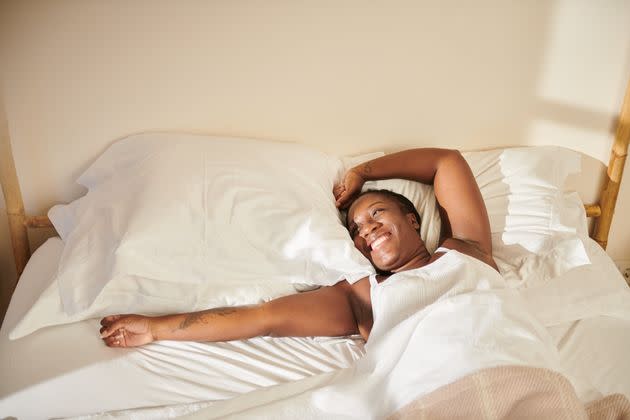'Hurkle-Durkling' Is The Newest TikTok Trend. Should We All Be Doing It?

The term "hurkle-durkle" is not new, but it's reaching new audiences in 2024.
We’re just one month into 2024, yet the social media sphere has already enriched our lexicon with phrases like “loud budgeting” and “Pookie is looking absolutely fire tonight.” But perhaps the quirkiest term on the rise is “hurkle-durkle.”
Hurkle-durkling is by no means a new concept. It’s actually from an old Scottish term meaning “to lie in bed or lounge about when one should be up and about.”
The phrase’s emergence from relative obscurity seems to stem from a TikTok posted on Jan. 9 from actor Kira Kosarin that’s since been viewed nearly 4 million times. In the video, Kosarin defines the term and expresses her affinity for this morning ritual.
“Hurkle-durkle,” of course, evokes another viral TikTok trend ― bed rotting ― but with more whimsical branding. Still, however you label it, the question remains: Is this an advisable practice? We asked mental health experts to weigh in.
The benefits of ‘hurkle-durkling’
“While I hadn’t heard of hurkle-durkle before the trend went viral, I love the concept and think more of us should embrace it,” said Marisha Mathis, a licensed clinical social worker with Thriveworks in Raleigh, North Carolina.
“It’s antithetical to the hustle culture we’re often inundated with that focuses on maximizing every moment of the day,” Mathis said. “However, sometimes prioritizing rest and having a slower start to the day is the best way to optimize your time and mental health.”
She believes the “hurkle-durkle” lifestyle can be a healthy form of self-care, as it offers the space to think and simply exist without interruption or pressure.
“It presents us with the opportunity to get much-needed rest, move at gentler pace and reset to properly approach the morning,” Mathis said.
The drawbacks of the trend
While embracing a hurkle-durkle ethos can be beneficial, there are also potential downsides.
“It might be a red flag when the hurkle-durkle extends beyond a slice of the morning and drags throughout the day, or becomes a regular occurrence that takes us away from our responsibilities or creates isolation from friends and family,” Mathis said. “This can contribute to or be a symptom of something more serious, such as depression.”
She added that hurkle-durkling might also negatively contribute to “overwhelming thoughts for those who struggle with sitting or being with their own thoughts.”
“I think there’s probably a limit or a time when it becomes an avoidance mechanism or sign that something else is going on,” said Dr. Jessica Gold, an associate professor of psychiatry at the University of Tennessee Health Science Center in Memphis. “Burnout comes to mind if the thing you don’t want to get up and do is go to work.”
Using a goofy-sounding phrase like “hurkle-durkle” might make it easier to avoid reflecting on just why you don’t want to get out of bed ― especially if this is a frequent occurrence.
“Sleep is super important to mental health, and our bodies are usually telling us something when we don’t want to get out of bed or want to keep sleeping,” Gold said. “Even though these things are fun and funny and create community, it’s important to also realize something could be going on, and your body is trying to tell you something.”
Although social media encourages mindless scrolling through videos and posts that you can quickly like and share, Gold emphasized the importance of not mindlessly scrolling through your mental health or the signals your body might be trying to send you.

Balance and mindfulness are the key to making hurkle-durkling part of your self-care regimen.
What’s the right way to embrace the hurkle-durkle?
As with most things in life, hurkle-durkling should be done with a sense of balance.
“I think doing it occasionally or doing it with intention is not a bad thing,” Gold said. “I don’t subscribe to the mentality that you should punish yourself for needing an extra 5-10 minutes in the morning, because that’s going to add more stress to the day. Self-compassion and having more awareness of what you’re doing, or the purpose of what you’re doing, is more important.”
Take a mindful approach to your hurkle-durkle moments, acknowledging that this is your time.
“Set some boundaries such as time limits and no interruptions, and enjoy yourself,” Mathis advised. “Take the time to grab a journal, listen to music or white noise, light a candle and truly relax.”
She also recommended keeping balance in mind.
“Make sure that you are not using hurkle-durkle to avoid tasks, conversations, or processes that need your attention,” Mathis said. “Also, be mindful of any negative impacts you may see as a result.”

 Yahoo News
Yahoo News 